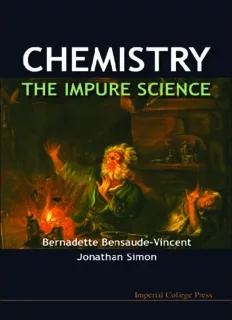
Chemistry The Impure Science PDF
Preview Chemistry The Impure Science
CHEMISTRY THE IMPURE SCIENCE TThhiiss ppaaggee iinntteennttiioonnaallllyy lleefftt bbllaannkk CHEMISTRY THE IMPURE SCIENCE Bernadette Bensaude-Vincent Universite Paris X, France Jonathan Simon Universite Lyon 7, France Imperial College Press Published by Imperial College Press 57 Shelton Street Covent Garden London WC2H 9HE Distributed by World Scientific Publishing Co. Pte. Ltd. 5 Toh Tuck Link, Singapore 596224 USA office: 27 Warren Street, Suite 401-402, Hackensack, NJ 07601 UK office: 57 Shelton Street, Covent Garden, London WC2H 9HE British Library Cataloguing-in-Publication Data A catalogue record for this book is available from the British Library. CHEMISTRY — THE IMPURE SCIENCE Copyright © 2008 by Imperial College Press All rights reserved. This book, or parts thereof, may not be reproduced in any form or by any means, electronic or mechanical, including photocopying, recording or any information storage and retrieval system now known or to be invented, without written permission from the Publisher. For photocopying of material in this volume, please pay a copying fee through the Copyright Clearance Center, Inc., 222 Rosewood Drive, Danvers, MA 01923, USA. In this case permission to photocopy is not required from the publisher. ISBN-13978-1-84816-225-9 ISBN-101-84816-225-1 Typeset by Stallion Press Email: [email protected] Printed in Singapore. ChingTing - Chemistry - The Impure.pmd 1 12/12/2008, 6:28 PM b609_FM.qxd 9/4/2008 10:17 AM Page v To Larry Holmes In Memoriam b609_FM.qxd 9/4/2008 10:17 AM Page vi TThhiiss ppaaggee iinntteennttiioonnaallllyy lleefftt bbllaannkk b609_FM.qxd 9/4/2008 10:17 AM Page vii ACKNOWLEDGEMENTS Both authors would like to start by thanking each other for the many fruit- ful intellectual exchanges both prior to the present project and during the preparation of Chemistry, The Impure Science. The authors would like to thank Phillippe Pignarre, editor of the series Les empecheurs de penser en ronde, and the publisher Seuil, for granting permission to use Bernadette Bensaude-Vincent’s book, Faut-il avoir peur de la chimie? (Paris, Seuil, 2005), which served as the inspiration for the present work. Bernadette Bensaude-Vincent would like to acknowledge her debt to Isabelle Stengers for her continuous inspiration and intellectual exigency. She is also grateful to all the participants in her annual seminars in the history of chemistry at the philosophy department of the University of Paris X — Nanterre. The reflections and expertise brought together in these seminars have significantly contributed to the present work. This book has also benefited from her interviews with a number of chemists, in particular Hervé Arribart, Jacques Livage, Michel Pouchard, and George Whitesides as well as collaborations with colleagues, notably William Newman and Arne Hessenbruch, who have shared her interest in impure sciences. Jonathan Simon gratefully thanks Ted McGuire and Peter Machamer, who “scrubbed his flanks” at the University of Pittsburgh. He also owes a great debt to Fritz Ringer, whose premature death deprived the academic world of a model of intellectual rigour. Nor will he soon forget his fellow students in Pittsburgh, in particular Ofer Gal, Andrea Woody, Silvia Castro, William Sutherland, Rachel Ankeny, Heather Douglas, and Michel Janssen. Although they probably would not want to be reminded of it, John Worrall, John Earman, John Norton, and Clark Glymour also vii b609_FM.qxd 9/4/2008 10:17 AM Page viii viii Chemistry — The Impure Science contributed to shaping Jonathan Simon’s philosophical perspective on sci- ence. Along the long road to secure employment, he has received support and encouragement from Hans-Jörg Rheinberger, Delphine Gardey, Nic Rasmussen, Jean-Paul Gaudillière, Volker Hess, Patricia Caillé, Axel Hüntelmann, John Ceccatti, and Christian Bonah. Last, but not least, a debt is due to Jessie, Owen, Alan, and Patricia for their invaluable assis- tance in the preparation of the text. The authors are pleased to include a number of images in the volume that serve as more than incidental illustrations. In assembling these images, we were helped by the staff of the Chemical Heritage Foundation in Philadelphia, Eva Wittig at Evonik Industries, Marta Lourenço at the Museum of Science of the University of Lisbon, Portugal, Michael Green and Frank Norman at the National Institute for Medical Research in England, as well as staff at the Bibliothèque Nationale Universitaire de Strasbourg and the Service Commun de la Documentation at the Université de Strasbourg. Thanks also to Anne Denuziere at the School of Pharmacy of the Université de Lyon for the information on the analysis of ions. Finally, the authors would also like to thank the editorial team at Imperial College Press for helping to produce a high-quality book in such a short time. Bernadette Bensaude-Vincent & Jonathan Simon May 2008. b609_FM.qxd 9/4/2008 10:17 AM Page ix CONTENTS Acknowledgements vii Chapter 1 Introduction: Chemistry and Its Discontents 1 The Philosophy of Chemistry 2 The Image of Chemistry 4 The Goals of the Book 5 The Structure of the Book 6 Chapter 2 Chemistry and Pollution 11 Chemical versus Natural 11 Chemistry in Literature 15 Silent Spring 17 “Better Things for Better 21 Living … Through Chemistry” Abundance and Waste 27 Courting Disaster 29 Artificial or Natural? 30 Chapter 3 The Damnation of the Alchemist 33 Magicians or Charlatans 33 In Defense of Artifice 37 Faustian Ambitions 39 From Extracts to Ersatz 42 Pure and Applied Chemistry 45 Artefacts as Hybrids of Nature and Society 46 ix
Description: